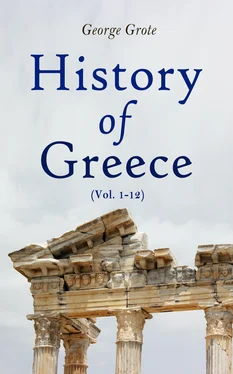George Grote - History of Greece (Vol. 1-12)
Здесь есть возможность читать онлайн «George Grote - History of Greece (Vol. 1-12)» — ознакомительный отрывок электронной книги совершенно бесплатно, а после прочтения отрывка купить полную версию. В некоторых случаях можно слушать аудио, скачать через торрент в формате fb2 и присутствует краткое содержание. Жанр: unrecognised, на английском языке. Описание произведения, (предисловие) а так же отзывы посетителей доступны на портале библиотеки ЛибКат.
- Название:History of Greece (Vol. 1-12)
- Автор:
- Жанр:
- Год:неизвестен
- ISBN:нет данных
- Рейтинг книги:5 / 5. Голосов: 1
-
Избранное:Добавить в избранное
- Отзывы:
-
Ваша оценка:
- 100
- 1
- 2
- 3
- 4
- 5
History of Greece (Vol. 1-12): краткое содержание, описание и аннотация
Предлагаем к чтению аннотацию, описание, краткое содержание или предисловие (зависит от того, что написал сам автор книги «History of Greece (Vol. 1-12)»). Если вы не нашли необходимую информацию о книге — напишите в комментариях, мы постараемся отыскать её.
History of Greece (Vol. 1-12) — читать онлайн ознакомительный отрывок
Ниже представлен текст книги, разбитый по страницам. Система сохранения места последней прочитанной страницы, позволяет с удобством читать онлайн бесплатно книгу «History of Greece (Vol. 1-12)», без необходимости каждый раз заново искать на чём Вы остановились. Поставьте закладку, и сможете в любой момент перейти на страницу, на которой закончили чтение.
Интервал:
Закладка:
Zeus, then, with his brethren and colleagues, constitute the present gods, whom Homer and Hesiod recognize as in full dignity and efficiency. The inmates of this divine world are conceived upon the model, but not upon the scale, of the human. They are actuated by the full play and variety of those appetites, sympathies, passions and affections, which divide the soul of man; invested with a far larger and indeterminate measure of power, and an exemption as well from death as (with some rare exceptions) from suffering and infirmity. The rich and diverse types thus conceived, full of energetic movement and contrast, each in his own province, and soaring confessedly above the limits of experience, were of all themes the most suitable for adventure and narrative, and operated with irresistible force upon the Grecian fancy. All nature was then conceived as moving and working through a number of personal agents, amongst whom the gods of Olympus were the most conspicuous; the reverential belief in Zeus and Apollo being only one branch of this omnipresent personifying faith. The attributes of all these agents had a tendency to expand themselves into illustrative legends—especially those of the gods, who were constantly invoked in the public worship. Out of this same mental source sprang both the divine and heroic mythes—the former being often the more extravagant and abnormous in their incidents, in proportion as the general type of the gods was more vast and awful than that of the heroes.
As the gods have houses and wives like men, so the present dynasty of gods must have a past to repose upon; 4and the curious and imaginative Greek, whenever he does not find a recorded past ready to his hand, is uneasy until he has created one. Thus the Hesiodic theogony explains, with a certain degree of system and coherence, first the antecedent circumstances under which Zeus acquired the divine empire, next the number of his colleagues and descendants.
First in order of time (we are told by Hesiod) came Chaos; next Gæa, the broad, firm, and flat Earth, with deep and dark Tartarus at her base. Erôs (Love), the subduer of gods as well as men, came immediately afterwards. 5
From Chaos sprung Erebos and Nyx; from these latter Æthêr and Hêmera. Gæa also gave birth to Uranos, equal in breadth to herself, in order to serve both as an overarching vault to her, and as a residence for the immortal gods; she further produced the mountains, habitations of the divine nymphs, and Pontus, the barren and billowy sea.
Then Gæa intermarried with Uranos, and from this union came a numerous offspring—twelve Titans and Titanides, three Cyclôpes, and three Hekatoncheires or beings with a hundred hands each. The Titans were Oceanus, Kœos, Krios, Hyperiôn, Iapetos, and Kronos: the Titanides, Theia, Rhea, Themis, Mnêmosynê, Phœbê, and Têthys. The Cyclôpes were Brontês, Steropês, and Argês,—formidable persons, equally distinguished for strength and for manual craft, so that they made the thunder which afterwards formed the irresistible artillery of Zeus. 6The Hekatoncheires were Kottos, Briareus, and Gygês, of prodigious bodily force.
Uranos contemplated this powerful brood with fear and horror; as fast as any of them were born, he concealed them in cavities of the earth, and would not permit them to come out. Gæa could find no room for them, and groaned under the pressure: she produced iron, made a sickle, and implored her sons to avenge both her and themselves against the oppressive treatment of their father. But none of them, except Kronos, had courage to undertake the deed: he, the youngest and the most daring, was armed with the sickle and placed in suitable ambush by the contrivance of Gæa. Presently night arrived, and Uranos descended to the embraces of Gæa: Kronos then emerged from his concealment, cut off the genitals of his father, and cast the bleeding member behind him far away into the sea. 7Much of the blood was spilt upon the earth, and Gæa in consequence gave birth to the irresistible Erinnys, the vast and muscular Gigantes, and the Melian nymphs. Out of the genitals themselves, as they swam and foamed upon the sea, emerged the goddess Aphroditê, deriving her name from the foam out of which she had sprung. She first landed at Kythêra, and then went to Cyprus: the island felt her benign influence, and the green herb started up under her soft and delicate tread. Erôs immediately joined her, and partook with her the function of suggesting and directing the amorous impulses both of gods and men. 8
Uranos being thus dethroned and disabled, Kronos and the Titans acquired their liberty and became predominant: the Cyclôpes and the Hekatoncheires had been cast by Uranos into Tartarus, and were still allowed to remain there.
Each of the Titans had a numerous offspring: Oceanus, especially, marrying his sister Têthys, begat three thousand daughters, the Oceanic nymphs, and as many sons: the rivers and springs passed for his offspring. Hyperiôn and his sister Theia had for their children Hêlios, Selênê, and Eôs; Kœos with Phœbê begat Lêtô and Asteria; the children of Krios were Astræos, Pallas, and Persês,—from Astræos and Eôs sprang the winds Zephyrus, Boreas, and Notus. Iapetos, marrying the Oceanic nymph Clymenê, counted as his progeny the celebrated Promêtheus, Epimêtheus, Menœtius, and Atlas. But the offspring of Kronos were the most powerful and transcendent of all. He married his sister Rhea, and had by her three daughters—Hestia, Dêmêtêr, and Hêrê—and three sons, Hadês, Poseidôn, and Zeus, the latter at once the youngest and the greatest.
But Kronos foreboded to himself destruction from one of his own children, and accordingly, as soon as any of them were born, he immediately swallowed them and retained them in his own belly. In this manner had the first five been treated, and Rhea was on the point of being delivered of Zeus. Grieved and indignant at the loss of her children, she applied for counsel to her father and mother, Uranos and Gæa, who aided her to conceal the birth of Zeus. They conveyed her by night to Lyktus in Crête, hid the new-born child in a woody cavern on Mount Ida, and gave to Kronos, in place of it, a stone wrapped in swaddling clothes, which he greedily swallowed, believing it to be his child. Thus was the safety of Zeus ensured. 9As he grew up his vast powers fully developed themselves: at the suggestion of Gæa, he induced Kronos by stratagem to vomit up, first the stone which had been given to him,—next, the five children whom he had previously devoured. Hestia, Dêmêtêr, Hêrê, Poseidôn and Hadês, were thus allowed to grow up along with Zeus; and the stone to which the latter owed his preservation was placed near the temple of Delphi, where it ever afterwards stood, as a conspicuous and venerable memorial to the religious Greek. 10
We have not yet exhausted the catalogue of beings generated during this early period, anterior to the birth of Zeus. Nyx, alone and without any partner, gave birth to a numerous progeny: Thanatos, Hypnos and Oneiros; Mômus and Oïzys (Grief); Klôthô, Lachesis and Atropos, the three Fates; the retributive and equalizing Nemesis; Apatê and Philotês (Deceit and amorous Propensity), Gêras (Old Age) and Eris (Contention). From Eris proceeded an abundant offspring, all mischievous and maleficent: Ponos (Suffering), Lêthê, Limos (Famine), Phonos and Machê (Slaughter and Battle), Dysnomia and Atê (Lawlessness and reckless Impulse), and Horkos, the ever watchful sanctioner of oaths, as well as the inexorable punisher of voluntary perjury. 11
Gæa, too, intermarrying with Pontus, gave birth to Nereus, the just and righteous old man of the sea; to Thaumas, Phorkys and Kêtô. From Nereus, and Doris daughter of Oceanus, proceeded the fifty Nereids or Sea-nymphs. Thaumus also married Elektra daughter of Oceanus, and had by her Iris and the two Harpies, Allô and Okypetê,—winged and swift as the winds. From Phorkys and Kêtô sprung the Dragon of the Hesperides, and the monstrous Grææ and Gorgons: the blood of Medusa, one of the Gorgons, when killed by Perseus, produced Chrysaor and the horse Pegasus: Chrysaor and Kallirrhoê gave birth to Geryôn as well as to Echidna,—a creature half-nymph and half-serpent, unlike both to gods and to men. Other monsters arose from the union of Echidna with Typhaôn,—Orthros, the two-headed dog of Geryôn; Cerberus, the dog of Hadês, with fifty heads, and the Lernæan Hydra. From the latter proceeded the Chimæra, the Sphinx of Thêbes, and the Nemean lion. 12
Читать дальшеИнтервал:
Закладка:
Похожие книги на «History of Greece (Vol. 1-12)»
Представляем Вашему вниманию похожие книги на «History of Greece (Vol. 1-12)» списком для выбора. Мы отобрали схожую по названию и смыслу литературу в надежде предоставить читателям больше вариантов отыскать новые, интересные, ещё непрочитанные произведения.
Обсуждение, отзывы о книге «History of Greece (Vol. 1-12)» и просто собственные мнения читателей. Оставьте ваши комментарии, напишите, что Вы думаете о произведении, его смысле или главных героях. Укажите что конкретно понравилось, а что нет, и почему Вы так считаете.












